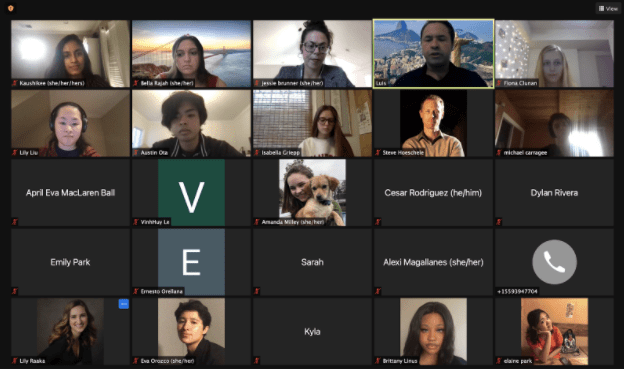As human trafficking persists globally, data could be pivotal in addressing the crisis, Center for Human Rights and International Justice experts said at a Friday panel.
Senior Program Manager Jessie Brunner M.A.’14 and visiting scholar Luis Fabiano de Assis believe data collection on human trafficking can bring much-needed guidance to policymakers. The event was hosted by the Society for International Affairs at Stanford.
Fabiano de Assis said it is about the “power of fostering accountability through transparency, and one of the ways we can promote that is through data and asking the right questions. It’s just a matter of engaging in data collection and using transparency laws to disclose information that is usually hidden from the general public.” This needs to be done not only at the national level but also the local one, according to the speakers.
Globally, over 40 million people are victims of some form of human trafficking and modern-day slavery. Nearly 25 million people are victims of forced labor and nearly five million are victims of sex trafficking. Human trafficking is especially about “abusing someone’s position of vulnerability,” according to Brunner.
Fabiano de Assis is a contributor to the Human Trafficking Data Lab, which focuses on multi-discplinary research to “develop new and innovative research methods to understand human trafficking broadly, as some of the basic questions about human trafficking have not been answered.”
Brunner explained that data on human trafficking typically lacks demographic data on victims or traffickers. More robust data collection “has a really big impact on not only how we understand trafficking but how we can better intervene and prevent it in the long-run,” she said. In collecting this data, policymakers can finally see the patterns of vulnerability among certain populations.
Locally, Brunner works with the San Francisco mayor’s Task Force on Anti-Human Trafficking. Part of her work involves pulling evidence from academic literature that highlights the vulnerability of certain identities to human trafficking, such as Bay Area youth experiencing houselessness. This evidence is then used “to support their push on policymakers, typically either for resources or government reform or for the passage of relevant legislation,” Brunner said.
The COVID-19 pandemic has brought new challenges to the fight against human trafficking. Brunner said that many people, particularly women or those out of work, have increased vulnerability to human trafficking. The lack of financial support for those who have lost work means labor exploitation can increase significantly.
Fabiano de Assis gave the example of Brazil, where COVID-19 has caused unemployment to skyrocket. During 2020, the Brazilian unemployment rate reached 13%, and more than 70 million people received emergency aid payments from the government, according to Fabiano de Assis.
“The vulnerabilities to trafficking have increased significantly,” Fabiano de Assis said.
Despite this increase, Brunner is hopeful that the pandemic has created an opportunity to deeply engage with these issues at a systemic level. “For trafficking to truly be eradicated or labor exploitation to really become a thing of the past, we have to rethink the way global economics are structured,” Brunner said.
The two also offered advice to students who are interested in supporting the anti-trafficking movement but are not dedicating their entire careers to this work.
“Whatever profession you choose, you will end up facing human rights issues,” said Fabiano de Assis. “Know your rights, and help people who do not know their rights to be aware.”
Contact Claudia Nmai canmai ‘at’ stanford.edu.
